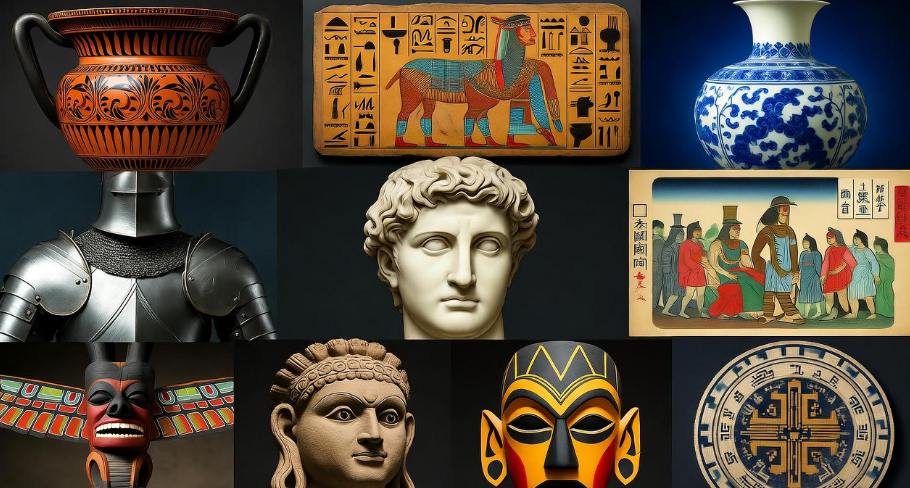When you look at the world today — from language and architecture to music and technology — you’ll realize that so much of what we see around us is shaped by great cultures that came before us. Some of these cultures have disappeared, but their legacy still echoes in how we live, think, and connect with one another.
In this article, we’ll take a journey through time and explore 10 of the most influential cultures in world history — the ones that shaped human civilization in ways that are still visible today.
Let’s dive in.
1. Ancient Egyptian Culture
The Egyptian civilization is one of the oldest and most mysterious in human history. Known for their impressive pyramids, hieroglyphic writing, and advanced understanding of mathematics and astronomy, the Egyptians were way ahead of their time.
They believed deeply in the afterlife, which influenced their art, architecture, and daily life. Their pyramids weren’t just tombs — they were symbols of eternity. Even today, people visit Egypt to admire the Pyramids of Giza, the Great Sphinx, and the Valley of the Kings.
Influence on the world:
-
Early development of writing systems (hieroglyphs).
-
Innovations in architecture and engineering.
-
Concepts of medicine, surgery, and embalming.
-
Religious and mythological influence on later cultures like Greece and Rome.
Fun fact: The Egyptians were among the first to use a 365-day calendar based on the movement of the sun.
2. Greek Culture
Ah, the Greeks — the foundation of Western civilization. Ancient Greece was not just about gods and myths; it was about philosophy, democracy, and human thought. Think of Socrates, Plato, and Aristotle — names that still shape modern education and thinking.
Greek culture gave birth to the Olympic Games, beautiful art, and dramatic theater. Their love for logic and beauty blended science, art, and literature in ways that still inspire people worldwide.
Influence on the world:
-
Birth of democracy and political science.
-
Philosophy and logic systems that guide education.
-
Early contributions to art, literature, and sports.
-
The concept of citizenship and individual rights.
Table: Greek Contributions at a Glance
| Area | Contribution | Modern Influence |
|---|---|---|
| Politics | Democracy | Modern governments |
| Philosophy | Socrates, Plato, Aristotle | Education systems |
| Sports | Olympics | Global athletic competitions |
| Architecture | Parthenon | Neoclassical buildings |
3. Roman Culture ️
If Greece gave the world ideas, Rome gave it structure. The Roman Empire was massive — stretching across Europe, North Africa, and Asia. They built cities, roads, aqueducts, and law systems that shaped modern civilization.
Romans believed in discipline, order, and governance. Their legal systems still form the basis of many modern constitutions. Latin, their language, evolved into Italian, Spanish, French, and Portuguese — imagine that ripple effect!
Influence on the world:
-
Legal systems (Roman Law).
-
Urban planning and infrastructure.
-
Architecture — arches, domes, and amphitheaters.
-
Latin language and alphabet.
Fun fact: The phrase “All roads lead to Rome” wasn’t just poetic — it reflected a real, advanced road network!
4. Chinese Culture
China’s culture is one of the world’s oldest and most continuous. With over 5,000 years of recorded history, Chinese civilization gave birth to inventions like paper, gunpowder, the compass, and printing.
Philosophers like Confucius and Laozi shaped not only Chinese society but also world thought. Their ideas about harmony, respect, and balance influence millions even today.
Influence on the world:
-
Inventions that changed global progress.
-
Confucian ethics and family values.
-
Calligraphy and traditional art.
-
Chinese medicine and martial arts.
Quick Look: Chinese Inventions That Changed History
| Invention | Century | Impact |
|---|---|---|
| Paper | 2nd century BCE | Spread of education |
| Compass | 11th century | Navigation and exploration |
| Gunpowder | 9th century | Military revolution |
| Printing | 8th century | Knowledge sharing |
5. Indian Culture
India has been a cradle of philosophy, spirituality, and diversity. The Indian subcontinent gave the world major religions like Hinduism, Buddhism, Jainism, and Sikhism — all of which emphasize peace, karma, and moral living.
India’s cultural expressions through dance, music, yoga, and festivals have inspired global fascination. The ancient Indian mathematicians were pioneers — the concept of zero and decimal system both came from here.
Influence on the world:
-
Major religions and spiritual systems.
-
Yoga and meditation practices.
-
Mathematics and astronomy.
-
Rich literature like the Mahabharata and Ramayana.
Fun fact: The game of chess originated in India over 1,500 years ago, known as Chaturanga.
6. Islamic Culture
From the 7th century onward, the Islamic world became a powerhouse of science, art, and knowledge. During Europe’s Dark Ages, Muslim scholars preserved ancient Greek and Roman texts and expanded upon them in fields like medicine, astronomy, and algebra.
Cities like Baghdad, Cordoba, and Cairo were centers of learning. Islamic art and architecture — like the Alhambra in Spain and the Blue Mosque in Turkey — still inspire awe.
Influence on the world:
-
Preservation and translation of ancient knowledge.
-
Advances in mathematics (algebra, algorithms).
-
Architectural marvels like domes and calligraphy.
-
Development in astronomy and medicine.
✨ Table: Key Muslim Scholars and Their Contributions
| Scholar | Field | Notable Work |
|---|---|---|
| Al-Khwarizmi | Mathematics | Introduced Algebra |
| Ibn Sina (Avicenna) | Medicine | The Canon of Medicine |
| Al-Biruni | Astronomy | Earth’s circumference calculations |
| Ibn Rushd (Averroes) | Philosophy | Commentaries on Aristotle |
7. Persian Culture
The Persian Empire (modern-day Iran) was known for its tolerance, administrative systems, and art. It connected the East and West through trade and ideas. Persian poetry, like that of Rumi and Hafez, continues to touch hearts across the globe.
They were also among the first to promote human rights. The Cyrus Cylinder — considered the world’s first human rights charter — came from Persia.
Influence on the world:
-
Early concepts of governance and human rights.
-
Poetry and literature that transcend cultures.
-
Architecture and urban design.
-
Persian carpets and decorative arts.
Fun fact: Ancient Persians were the first to use postal systems for official communication.
8. Mayan Culture
The Mayans of Central America were experts in astronomy, mathematics, and calendar systems. Long before modern telescopes, they tracked stars and planets with astonishing accuracy.
Their pyramid-temples and symbolic writing (glyphs) reveal a deep understanding of nature, time, and spirituality.
Influence on the world:
-
Early calendar systems that inspired later studies.
-
Sophisticated mathematics (including the use of zero).
-
Architecture and agriculture adapted to tropical environments.
Quick Note: The Mayans’ understanding of time cycles remains one of the most advanced in pre-modern history.
9. African Cultures
Africa’s influence is often underestimated, but its cultural depth is extraordinary. From ancient kingdoms like Mali and Kush to the artistic traditions of West Africa, this continent shaped global music, rhythm, and storytelling.
African oral traditions, drumming, and art inspired later global movements in jazz, blues, and modern pop culture.
Influence on the world:
-
Storytelling and oral literature.
-
Rhythmic music and dance styles.
-
Ancient metallurgy and trade systems.
-
Unique art and sculpture techniques.
Fun fact: The ancient city of Timbuktu was once a global center of learning, with libraries filled with thousands of manuscripts.
10. Western (European) Culture
From the Renaissance to the Industrial Revolution, Western culture reshaped the modern world. Art, science, and exploration boomed during this period, leading to rapid technological and intellectual progress.
European philosophy, human rights movements, and technological innovations have shaped global politics, education, and communication.
Influence on the world:
-
Scientific revolution and industrialization.
-
Global spread of education and democracy.
-
Art, literature, and architecture.
-
Modern technologies and digital systems.
Fun fact: The Renaissance started in Italy but quickly spread throughout Europe — sparking one of the greatest creative explosions in history.

Summary Table: The 10 Most Influential Cultures
| Rank | Culture | Major Contributions |
|---|---|---|
| 1 | Egyptian | Architecture, writing, medicine |
| 2 | Greek | Philosophy, democracy, arts |
| 3 | Roman | Law, infrastructure, governance |
| 4 | Chinese | Inventions, philosophy, calligraphy |
| 5 | Indian | Religion, mathematics, yoga |
| 6 | Islamic | Science, art, architecture |
| 7 | Persian | Literature, governance, culture |
| 8 | Mayan | Astronomy, math, agriculture |
| 9 | African | Music, storytelling, trade |
| 10 | Western | Technology, science, democracy |
FAQs
Q1: Which culture influenced modern life the most?
It’s hard to pick one! Western, Greek, and Roman cultures heavily shape modern governance and science, while Eastern (Chinese and Indian) cultures influence philosophy, medicine, and spirituality.
Q2: Why are ancient cultures still important today?
They laid the foundation for everything — from language and law to art and innovation. Studying them helps us understand where our ideas and systems came from.
Q3: Are these cultures still alive today?
Yes, most continue through traditions, languages, and customs that evolved but kept their original essence intact.
Q4: How did trade affect cultural influence?
Trade routes, like the Silk Road, allowed ideas, inventions, and art to travel across continents — making these cultures globally influential.
Q5: What’s one thing all great cultures had in common?
Curiosity and creativity. Every influential culture sought knowledge, beauty, and progress — and shared it with the world.
Final Thoughts
Every culture in history, big or small, added something unique to humanity’s story. From the wisdom of the East to the creativity of the West, these civilizations didn’t just build empires — they built the foundation of who we are today.
The beauty of world culture lies in its diversity. Each civilization — whether it was the artistic Greeks, the philosophical Indians, or the inventive Chinese — taught us that progress comes not from isolation, but from sharing and learning.
And that’s what truly makes culture timeless.




